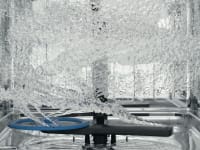Why Is My Dishwasher So Slow?
Dishwashers just aren't as quick as they used to be. Here's why.
 Credit:
Flickr user "martingreffe"
Credit:
Flickr user "martingreffe"
Products are chosen independently by our editors. Purchases made through our links may earn us a commission.
Dishwashers nowadays take longer to finish a load than they did 10 years ago. Dozens and dozens of dishwashers have passed through our labs over the past few years, and we’ve found that the length of the average Normal cycle on a consumer dishwasher stands at between 2 and 2.5 hours.
That’s longer than it takes to wash and dry a load of laundry. So what gives?
It's complicated, but the short answer is that dishwashers of today are designed to be more environmentally friendly, more efficient, and quieter than models from years past. And the long answer? Well, follow along and we'll break down how each of these factors led to longer, slower (if more efficient) cycles.
The Detergent Formula Changed
One reason why dishwashers of yore were quicker than today’s machines is because, in 2010, detergent makers changed their formula after 16 states banned phosphates. Those phosphates were extremely effective at zapping away food stains and softening water, but had nasty ecological side effects.
Instead, today's dishwasher detergent uses enzymes to eat away at the chemical bonds that help food particles cling to your dishes and silverware. The enzymes take time to work—potentially a lot of time, depending on the type of food and the material it’s bonded to. Something like butter on porcelain comes off easily, but sugar fused to metal takes a lot more time.
Dishwasher makers know this, so they've extended their cycle times to ensure the enzymes have time to do their business.
The Government Wants Greater Efficiency
{{amazon name="Cascade Complete, Powder Dishwasher Detergent, Fresh Scent 125 Oz", asin="B00LLPEPAY", align="right"}} A controversial proposal by the Department of Energy earlier this year called for even greater dishwasher efficiency, but the truth is that dishwashers are already incredibly efficient. In order to meet Energy Star guidelines, a Normal cycle needs to use less than 295 kWh per year and less than 4.25 gallons per run.
Judging by our lab data, every single dishwasher we've tested meets these rather stingy criteria.
But how does low electricity and water usage lead to longer cycles? It's a matter of engineering, and the finer details of how it’s achieved are closely guarded secrets held by each manufacturer. But one thing we do know is that many dishwashers' wash arms spin using hydraulic pressure instead of motors, so they’re not drawing power to spread water around the tub.
Dishwashers also recycle the same water multiple times throughout the wash, filtering out food particles as they go. This “dirty” water isn’t drained until after it’s been thoroughly used—usually after about an hour on Normal. After that, there’s a final rinse using clean water, which adds yet more time to the entire process.
Consumers Want Quieter Machines
It's a simple truth: People like their dishwashers to be quiet.
There are lots of ways to reduce noise, but most of them involve reducing the machine's cleaning power, and that in turn means lengthening the cycle times to compensate. From reducing water pressure to using passive filters (that you’d have to manually clean) instead of noisy food choppers, every sound-deadening feature adds minutes to the stopwatch.
But reduced spray intensity is definitely the biggest culprit. If you can’t use concentrated jets of water to blast stains away, what else can you do? The answer is to have longer cycles with multiple washes. Lower-intensity jets won’t clean dishes in a single pass, but in combination with detergent and repeated effort, they eventually will.
The upside is that most dishwashers today are quieter than your average conversation. And since they’re so quiet, most consumers don't mind running them overnight—perhaps a necessary evil, given how long they take to run.
But What About Speed Cycles?
Many dishwashers still offer a way to relive those glorious days of lightning-fast cycles.
If you own a newer machine, look for a "speed" cycle (also "Quick," "1-Hour," or "Express"). This cycle is designed to clean a load more quickly, usually by using more water. Data gathered in our lab tests has shown that most such cycles deliver on their hour-or-less promise, though they can use up to twice as much water as their Normal counterparts.
Where speed cycles fall short of older dishwashers is in raw cleaning power. That's because while they can be as loud and inefficient as they want, they’re still limited to using the new, enzyme-based detergent. Our tests have consistently found that speed cycles can't remove baked-on food, or stains that have been left to sit overnight.
Related Video
{{brightcove '4628399172001'}}


